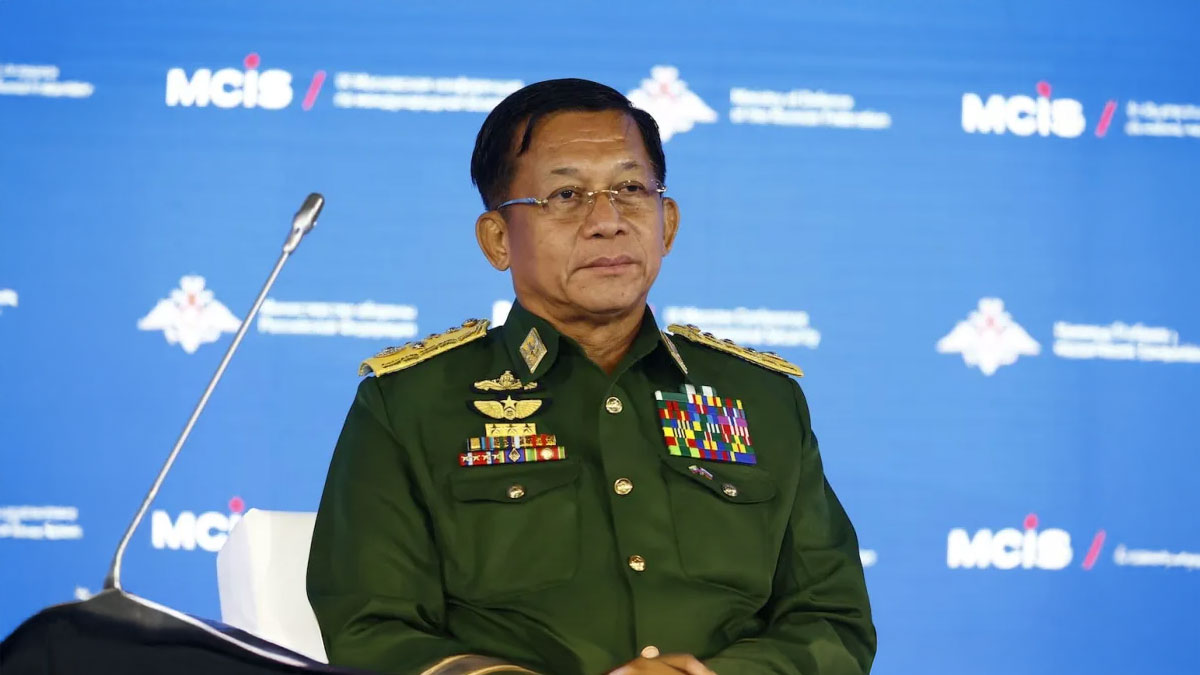
In February, Myanmar Senior General Min Aung Hlaing stood beside President Vladimir Putin and declared the Russian leader a “great Buddhist prophet”—a statement that was as bizarre as it was revealing.
While hyperbole may explain part of the pronouncement, the deeper motive was clear: Myanmar’s embattled junta leader was desperately seeking legitimacy from a great power, even if it required absurd flattery. The problem, however, is that neither his words nor actions reflect his reality.
Min Aung Hlaing presides over a regime that, by certain estimates, controls less than 30% of Myanmar’s territory. Ethnic armed groups, spearheaded by the Three Brotherhood Alliance, have pushed the Myanmar military into retreat across multiple fronts.
The opposition National Unity Government (NUG), meanwhile, is gaining international support while disparate resistance movements increasingly coordinate their offensives.
Despite all this, the four-year-old, coup-installed State Administration Council (SAC) junta clings to illusions of control, offering hollow promises of new elections this year that few will view as free, fair or legitimate.
The general’s words in Moscow were not mere flattery; they were a calculated move. Russia remains one of Myanmar’s few reliable military suppliers, offering arms and diplomatic cover at the United Nations.
By invoking Buddhism—a faith that Putin has no credible association with—Min Aung Hlaing was attempting to frame Russia’s support as though it were somehow preordained, transcending the political here and now.
Putin, for his part, offered nothing in return apart from vague assurances of continued cooperation. If anything, the Russian leader, now bogged down in Ukraine, views Myanmar as a secondary priority—a pawn rather than a partner.
Yet, Min Aung Hlaing clings to Moscow knowing that China, the regime’s other major international supporter, plays a more transactional and complex game. While Beijing provides diplomatic and economic backing to the junta, it also maintains ties with Myanmar’s ethnic armed groups, ensuring its influence regardless of who prevails.
That’s an increasingly open question amid the junta’s growing battlefield losses, forcing it to call up retired officers and offer expedited citizenship to foreigners willing to enlist.
According to security analyst and Asia Times contributor Anthony Davis, “Never before has the Tatmadaw (Myanmar military) faced such a broad and well-coordinated armed resistance.”
That’s driving the Association of Southeast Asian Nations (ASEAN), widely criticized for its stillborn Five-Point Consensus for solving the crisis, to shift its stance amid rising fears of a humanitarian crisis that sends shockwaves across the region.
Significantly, the regional bloc has stopped advocating for new elections and instead called for an immediate ceasefire as the only viable path to stabilization.
Indonesia, Malaysia and Singapore have been the most vocal critics of the junta, with Jakarta leading back-channel talks to broker a pause in hostilities.
However, Min Aung Hlaing has shown no intention of agreeing to a ceasefire, likely because he views military dominance as his only path to survival. His recent rejection of ASEAN’s calls for compromise suggests that Myanmar’s conflict will persist well beyond 2026.
According to Professor Zachary Abuza, an expert on Southeast Asian security at the National War College in Washington DC, “Min Aung Hlaing’s refusal to compromise is not just a political miscalculation—it’s a guarantee that Myanmar’s fragmentation will continue.”
While Min Aung Hlaing’s war rages on, Aung San Suu Kyi’s influence is on the wane.
Once seen as the inevitable leader of Myanmar’s democratic transition, she now languishes in prison with slim prospects for a political revival without regime collapse. At 78 years old, her health is reportedly deteriorating while the junta holds her in near-total isolation.
Unlike past military crackdowns, where Suu Kyi’s release from detention signaled a shift toward reconciliation between military and democratic camps, her current imprisonment has not galvanized the opposition in the same way.
Indeed, the resistance movement has evolved beyond her and is now driven by younger, more radical factions who see armed struggle—as opposed to the peaceful protest for which Suu Kyi previously received a Nobel Peace Prize—as the only viable path to political change.
The bigger question is who, if anyone, will succeed Suu Kyi. While figures within the NUG have emerged as new faces of the pro-democracy movement, none carry Suu Kyi’s unifying power.
Her absence has created a leadership vacuum that, in the long run, could further fragment the opposition to the military’s advantage. Myanmar’s future is now more likely to be shaped by a new generation of hardened resistance leaders who emerge from the country’s scorched-earth conflict zones.
For Min Aung Hlaing, this reality presents a double-edged sword.
On one hand, Suu Kyi’s diminishing influence weakens the traditional opposition. On the other, her absence removes the one figure who, at least in theory, could broker a negotiated settlement he may soon need in the face of battlefield losses.
Min Aung Hlaing’s predicament is clear: he is waging a war he cannot win, alienating international actors he cannot afford to lose and accentuating a legitimacy crisis that his recently declared elections for later this year won’t remotely resolve.
And all the while, his attempt to project strength—whether through grandiose declarations in Moscow or rousing battlefield rhetoric at home—fails to mask underlying hard truths: the Tatmadaw’s grip is slipping, the junta’s survival is under rising threat, and the senior general’s future, despite his delusions of grandeur, is increasingly in doubt.
Article was first published at the Asia Times on 19 March 2025.
Last Update: 06/04/2025